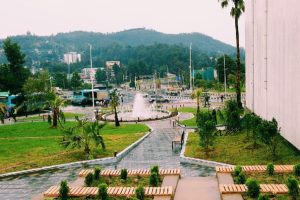
BY MENGISTEAB TESHOME
September, (Meskerem, the first month of the Ethiopian year) is the month that denotes hope, unity and love among Ethiopians.The month, as it comes following the end of the dark rainy season; and heralds the beginning of bright sunny days, it symbolizes new beginning, bright future and stimulates good spirit and optimistic feeling.
Aside from New Year celebration, Meskerem is also a month thata number of important festivals are celebrated across the country. Being in thespiritof festiveness, therefore, Ethiopians celebrate Demera, an event that takes places on the eve of the Ethiopian Meskel Festival and marked through burning of a bonfire with large gatherings of celebrants,the Ethiopian Meskel Festival, that marks the Finding of the True Cross on which Jesus Christ was crucified, Irreecha Festival, a Thanks giving Day, celebrated by Oromo people to mark the end of the rainy months of the year and the start of the spring seasonto give thanks to Waqaa (God)as well asGifaata,a cultural New Year celebration marked by the Wolayta peoplein every mid-September, in the first month of the year excitedly.
Currently, Ethiopians are readying themselves to celebrate those annual outdoorfestivals warmly and colorfully with large gatherings. Because the festivals are celebrated irrespective of ethnic, religious or any other differences; they are considered as festivals that symbolize peace, unity, love, for giveness and reconciliation.
The festivals, aside from drawing Ethiopians from across the world to attend the events, many tourists who come to Ethiopia spend a wonderful time and garner especial experiences.
In connection with the festivals, particularly Meskel Festival, The Ethiopian Herald had approached MekibibGebremariam,Senior Expert at Addis Ababa Culture and Tourism Bureau to share his insight.
Meskel is ahugely important religious holiday in Ethiopia, , especially among followers of the Ethiopian Orthodox Church. The festival is now on the Representative List of the Intangible Cultural Heritage of Humanity by the UN Agency for Education, Science and Culture.Though, Ethiopia is the most suitable country for tourists all year round because of its weather condition the true adventures experiences,its unique colorful street festivals, efforts to familiarize to the outside world is not at the desired level.
“Apart from nation’s newly built tourist destinations, in my view,the varieties of destinations its endowments- rich history and culture- are enough to attract tourists.So, the effort to promote them to the entire world should be intensified.
As many tourists who had a chance to visit Ethiopia stated, the nation is different from other East African countries owing to its wonderful climate, unpredictable land, and unique religious and cultural festivals. However, the efforts to introduce the heritages are not yet going well, thus, he recommended,to strengthen efforts more than it has ever been before.
“Some nations with less number of tourist attractions are performing well and earning great benefits; because they have well-established system of promotion and services to the international tourists and local ones.”
As to him, to the fill the gaps, Ethiopian ambassadors,and concerned ministries as well investors should work in harmony.
Demera and Meskel festivals in Ethiopia are one of the country’s most important religious occasions that are highly recommended for visitors from overseas. As the festivals, especially Demera, is celebrated on the streetsuniquely with various rites and scenes, includingblazing of huge bonfire,church chants, religious hymn sand songs of praise by Sunday school students and laities adorned in cultural outfits, mostly in white, it can yield significant economic benefits to the country.
As to him, watching while the Ethiopian Orthodox Church deacons, priests, choir and worshipers from different churches and diocese make an elaborate procession to the Demera place, singing about the power of the cross and its findingsit, is a wonderful and unforgettable scene, not only for foreign tourists; but also local people.
Mentioning that the Bureau is working with all pertinent stakeholders to ensure peaceful celebration and make the stay extraordinary, he urged the public to discharge its responsibility accordingly and make the festival a success.
Oromo Culture Center former Senior Researcher Alemayehu Hailufor his part noted that Irreecha, a thanks giving festival, has rich history that could benefit all humans.Since recent times, it was not well nurtured for various reasons. Thanks to the efforts by fellow citizens and scholars, the festival hasnow got attention. “In my view acknowledging others culture is civility, peoples in the market chain can attract the tourists and benefit from the sector.”
Irreecha should be well heralded to others because it can create great opportunities in the tourism industry. It is high time to organize efforts to invite international tourists through various channels.
According to him, simply Irreecha is chiefly a thanksgiving festival celebrated at the end of the winter season in the country, particularly in OromiaState.
“We witness locals dressing in traditional costumes and observing Irreecha with dancing, singing, and gathering together with relatives. A big part of the celebration involves going to the lakes around Oromia State and placing freshcut grass and flowers in the water to thank God for all his blessings; and for good fortune and prosperity over the coming year.
While this year’s Demera and Meskel festivals will be celebrated on September 26 and 27, 2022 respectively, Irreecha festivals will take place on October 1 and 2, 2022 in Oromia State, Addis Ababa, Hora Finfine,and Bishoftu Town correspondingly. However, the biggest celebrations will take place in Hora Harsadi, Bishoftu- a town about 44km outside of Addis Ababa-on October 2, 2022.
Following the preparation, Abagadasand religious leaders have called on the general public to come together and mark the festivals in a peaceful manner.
THE ETHIOPIAN HERALD FRIDAY 23 SEPTEMBER 2022





